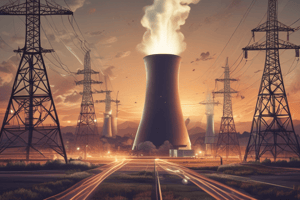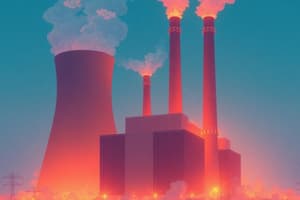Podcast
Questions and Answers
What is the ultimate source of energy on Earth?
What is the ultimate source of energy on Earth?
- The Sun (correct)
- Fossil fuels
- Electricity
- Machines
What is a fuel?
What is a fuel?
- Any hydrocarbon compound
- Any substance that produces steam
- Any machine that generates electricity
- Any substance from which energy can be obtained (correct)
How is electricity generated?
How is electricity generated?
- Fuel produces heat, heat cools down, and the turbine spins
- Fuel produces steam, steam exerts pressure on giant machines called turbines, causing them to turn, the spinning of the turbines in a magnetic field generates electricity (correct)
- Fuel produces steam, steam cools down, and the turbine spins
- Fuel produces electricity directly
What is a hydrocarbon?
What is a hydrocarbon?
What are the steps to form coal?
What are the steps to form coal?
Which type of coal is most commonly used in the US?
Which type of coal is most commonly used in the US?
What is the primary difference in the formation process between petroleum and coal?
What is the primary difference in the formation process between petroleum and coal?
What is a common component of petroleum, often used in vehicles?
What is a common component of petroleum, often used in vehicles?
Where are most of the world's petroleum reserves located?
Where are most of the world's petroleum reserves located?
What is the least harmful fossil fuel to the environment?
What is the least harmful fossil fuel to the environment?
What is bioconversion?
What is bioconversion?
Flashcards are hidden until you start studying
Study Notes
Energy Sources
- The ultimate source of energy on Earth is the Sun
- A fuel is any substance from which energy can be obtained
Electricity Generation
- Electricity is generated by fuel producing steam, which exerts pressure on turbines, causing them to turn and generate electricity in a magnetic field
Society's Energy Needs
- As society advances, it requires more energy due to the increased use of machines
Hydrocarbons
- A hydrocarbon is a compound composed only of carbon and hydrogen
Fossil Fuels
- Fossil fuels are created when dead organisms are buried and not broken down by decomposers, under favorable conditions of temperature and pressure
- It takes millions of years for fossil fuels to be formed
- The three main types of fossil fuels are coal, petroleum, and natural gas
Coal
- Coal is formed in a stepwise fashion: peat, lignite, bituminous, and anthracite
- Peat is a brittle, brown plant material containing a great deal of water and a low percentage of carbon
- Lignite is found under the surface and must be mined
- Bituminous coal is a soft coal composed of up to 85% carbon, formed deep in Earth's crust, and is the most commonly used in the US
- Anthracite coal is a hard coal composed of up to 95% carbon
Petroleum
- Petroleum is formed from the remains of aquatic plants and animals buried in sediments at the bottom of the ocean
- Petroleum is retrieved from below the surface of the Earth when a well is drilled, and the pressure forces the oil upwards
- Petroleum contains various components, including gasoline, jet fuel, diesel fuel, grease, asphalt, and nylon plastics
- Most of the world's petroleum reserves are located in Persian Gulf nations
Natural Gas
- Natural gas is commonly found in Russia
- Natural gas is the least harmful to the environment compared to other fossil fuels
Biomass Fuels
- Biomass fuels are fuels formed from the products of living organisms
- Biomass fuels are renewable
- Examples of biomass fuels include wood, garbage, and bioconverted organic materials
Environmental Concerns
- Global warming is the long-term warming of the planet's overall temperature
- Global warming is caused by the burning of fossil fuels and deforestation, which influences the Earth's climate and temperature
- Negative effects of global warming include the release of CO2 into the atmosphere, leading to pollution
Studying That Suits You
Use AI to generate personalized quizzes and flashcards to suit your learning preferences.





